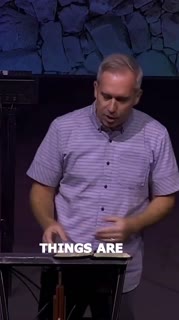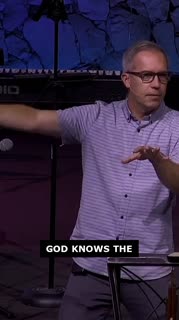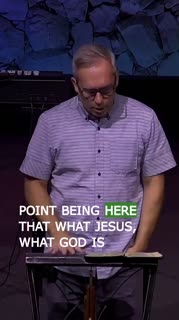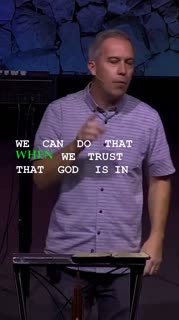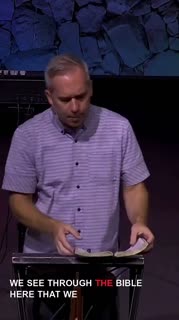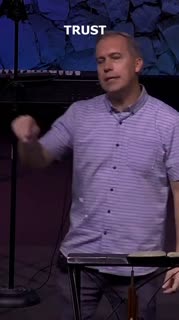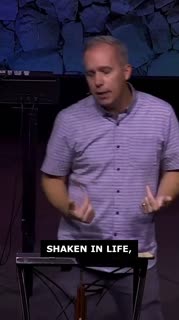Standing Firm: Embracing God's Presence in Uncertainty
Devotional
Sermon Summary
Bible Study Guide
Sermon Clips
1. "But those things are unsettling. And that's what we're talking about this morning is standing firm. And kind of when life gets unsettled and life is difficult and things come at us and how do we stand firm in those things? We are the king of Israel at this time, or the king of Judah. I'm sorry. The king of Judah at this time. The southern kingdom, Ahaz, is going through a little bit of an unsettling time. And so we're going to look at what God does in his life to help him there." [27:11] (34 seconds)
2. "God doesn't like that because God says, I will be your defender. I will protect you, seek me. But Ahaz, we know down in Judah, was not one who was listening to God. And so Isaiah is going to get called here to talk to Ahaz. We know Ahaz didn't follow God because in two kings, chapter 16, when it talks about Ahaz, he comes to power when he's 20 years old. He reigns for 16 years. It says that he was, did not follow his father, Uzziah, who was a good king, but he went after the bad kings of the kings of the north of Israel, even so much as this. He had his son pass through the fire, which what that means is not that they walked on coals or something like that, but they actually burned, sacrificed. He sacrificed one of his sons to an idol." [32:22] (64 seconds)
3. "He is shaken. He is disturbed in his soul. Have you ever been disturbed in your soul? Have you ever been shaken in your soul? When something, you get bad news or something changes, you lose your job or something happens, a friend turns against you, all sorts of things happen, health issues, all financial issues, things that come at you that shake us. This is what's happening to Ahaz. Here he is being shaken. He's unsettled. And all of Israel, because they see the Arameans with Israel coming up against them." [35:12] (33 seconds)
4. "God knows the situation that has come against you that is causing you to be unsettled. God knows. God is telling Ahaz through Isaiah, I already know what's going on. This is not hidden from me. I'm in control. He says, it shall not stand, nor shall it come to pass. It's not going to happen. He goes, because verse eight, the head of Aram is Damascus. What does he mean by that? The head of Aram being Damascus, right there. Damascus, the capital of Aram. He says, look, look, Aram, its capital is Damascus. That's where the king sits. And who sits on the throne there? He says, the head of Damascus is Rezin, this king. He's a mAn. He's a smoldering firebrand. He's nothing to me. I'm God. He's nothing." [39:52] (62 seconds)
5. "The point being here that what Jesus, what God is saying through Isaiah is this, I want you to stand firm because I'm in control. Stand firm because God is in control. He knows the future. He's in control of it all. He sees it all. He is in control. The theological term for that is, he is sovereign. He is sovereign over all things. And so he tells him here at the end of verse nine, if you will not believe that the hebrew word therefore not believe is, if you will not stand firm, if you will not stand firm, you shall surely not last or endure. You will die. You need to stand firm. We need to stand firm as well." [43:52] (53 seconds)
6. "We can do that when we trust that God is in control. There's a lot of things that are out of our control. Most things that we have anxiety about, that we stress about and worry about or unshaken about are completely out of our control. Some things are in our control. We can control our actions, and we can control our reactions. Right? That's all we can control. We can't control other things. Kind of like heart disease. Like, there are some things like. That are preventable when it comes to heart disease, I can do some things about that, but sometimes there's not. So there's some times heart disease is going to happen that is outside of your control. A lot of things in life, we can control certain things. So we can always control our actions and our reactions, but that's it." [45:44] (46 seconds)
7. "God's given us the end. He tells us what's gonna happen. There's gonna be God wins and his people reign with him in his kingdom, God wins. And so we go through this life and we start stressing out about things, not realizing, wait, God's in control. God is going to produce the outcome in the end that he wants. I'm not saying that everything that happens in life, God makes happen, because otherwise God would have to be the author of sin and God is not. But God knows what's going to happen. God knows the things you will freely choose to do. He's seen it all. He already knows. And he has already made provisions for all of those things so that the outcome that he wants will happen. God's in control, and so we need to trust in that." [47:48] (50 seconds)
8. "We see through the Bible here that we see prophecy after prophecy being fulfilled. We see this prophecy getting fulfilled later on in history. We see prophecies all the time that were spoken of. Daniel prophesied kingdoms that weren't even in existence yet. He prophesied the Greeks and the Romans that weren't even in existence. He told these things. He told how a lot of wars would happen, and they happened. We see over and over again through the Bible that God's word is true, that this isn't just some book of man, that 66 different books, all compiled, placed together by 40 different authors speaking over 1500 years. They are writing these things down, but it's completely unified, telling one whole story." [59:09] (49 seconds)
9. "We can trust God when life gets shaky and life gets difficult, we can trust in a goddess who is in control and his word is true, and we can take him at his word that he has got this all in hand, that he will be with us, that he is greater than all those things. If we lift up our prayers to him, he will hear us. God is true. God is good. And we can have confidence that his word is true. And then finally, we can stand firm because he is with us. This name, Emmanuel, means God is with us." [01:02:18] (35 seconds)
10. "When we get shaken in life, we often feel alone, right? We feel like, oh, I'm the only one. I'm struggling. No one is here with me. Who is going to help me? Who's going to carry my burdens? Who is going to be with me? Who is going to hear me. No one gets it. No one understands me. We start to feel very alone and isolated. And Jesus said to us that he will never leave us nor forsake us. He is the Emmanuel. This was fulfilled in Jesus Matthew, as he recounts the story of the virgin birth. Matthew says it fulfilled this, that a virgin would give birth to a son and he would be God with us. Jesus is Emmanuel. God with us." [01:03:24] (46 seconds)
Ask a question about this sermon
2. "God doesn't like that because God says, I will be your defender. I will protect you, seek me. But Ahaz, we know down in Judah, was not one who was listening to God. And so Isaiah is going to get called here to talk to Ahaz. We know Ahaz didn't follow God because in two kings, chapter 16, when it talks about Ahaz, he comes to power when he's 20 years old. He reigns for 16 years. It says that he was, did not follow his father, Uzziah, who was a good king, but he went after the bad kings of the kings of the north of Israel, even so much as this. He had his son pass through the fire, which what that means is not that they walked on coals or something like that, but they actually burned, sacrificed. He sacrificed one of his sons to an idol." [32:22] (64 seconds)
3. "He is shaken. He is disturbed in his soul. Have you ever been disturbed in your soul? Have you ever been shaken in your soul? When something, you get bad news or something changes, you lose your job or something happens, a friend turns against you, all sorts of things happen, health issues, all financial issues, things that come at you that shake us. This is what's happening to Ahaz. Here he is being shaken. He's unsettled. And all of Israel, because they see the Arameans with Israel coming up against them." [35:12] (33 seconds)
4. "God knows the situation that has come against you that is causing you to be unsettled. God knows. God is telling Ahaz through Isaiah, I already know what's going on. This is not hidden from me. I'm in control. He says, it shall not stand, nor shall it come to pass. It's not going to happen. He goes, because verse eight, the head of Aram is Damascus. What does he mean by that? The head of Aram being Damascus, right there. Damascus, the capital of Aram. He says, look, look, Aram, its capital is Damascus. That's where the king sits. And who sits on the throne there? He says, the head of Damascus is Rezin, this king. He's a mAn. He's a smoldering firebrand. He's nothing to me. I'm God. He's nothing." [39:52] (62 seconds)
5. "The point being here that what Jesus, what God is saying through Isaiah is this, I want you to stand firm because I'm in control. Stand firm because God is in control. He knows the future. He's in control of it all. He sees it all. He is in control. The theological term for that is, he is sovereign. He is sovereign over all things. And so he tells him here at the end of verse nine, if you will not believe that the hebrew word therefore not believe is, if you will not stand firm, if you will not stand firm, you shall surely not last or endure. You will die. You need to stand firm. We need to stand firm as well." [43:52] (53 seconds)
6. "We can do that when we trust that God is in control. There's a lot of things that are out of our control. Most things that we have anxiety about, that we stress about and worry about or unshaken about are completely out of our control. Some things are in our control. We can control our actions, and we can control our reactions. Right? That's all we can control. We can't control other things. Kind of like heart disease. Like, there are some things like. That are preventable when it comes to heart disease, I can do some things about that, but sometimes there's not. So there's some times heart disease is going to happen that is outside of your control. A lot of things in life, we can control certain things. So we can always control our actions and our reactions, but that's it." [45:44] (46 seconds)
7. "God's given us the end. He tells us what's gonna happen. There's gonna be God wins and his people reign with him in his kingdom, God wins. And so we go through this life and we start stressing out about things, not realizing, wait, God's in control. God is going to produce the outcome in the end that he wants. I'm not saying that everything that happens in life, God makes happen, because otherwise God would have to be the author of sin and God is not. But God knows what's going to happen. God knows the things you will freely choose to do. He's seen it all. He already knows. And he has already made provisions for all of those things so that the outcome that he wants will happen. God's in control, and so we need to trust in that." [47:48] (50 seconds)
8. "We see through the Bible here that we see prophecy after prophecy being fulfilled. We see this prophecy getting fulfilled later on in history. We see prophecies all the time that were spoken of. Daniel prophesied kingdoms that weren't even in existence yet. He prophesied the Greeks and the Romans that weren't even in existence. He told these things. He told how a lot of wars would happen, and they happened. We see over and over again through the Bible that God's word is true, that this isn't just some book of man, that 66 different books, all compiled, placed together by 40 different authors speaking over 1500 years. They are writing these things down, but it's completely unified, telling one whole story." [59:09] (49 seconds)
9. "We can trust God when life gets shaky and life gets difficult, we can trust in a goddess who is in control and his word is true, and we can take him at his word that he has got this all in hand, that he will be with us, that he is greater than all those things. If we lift up our prayers to him, he will hear us. God is true. God is good. And we can have confidence that his word is true. And then finally, we can stand firm because he is with us. This name, Emmanuel, means God is with us." [01:02:18] (35 seconds)
10. "When we get shaken in life, we often feel alone, right? We feel like, oh, I'm the only one. I'm struggling. No one is here with me. Who is going to help me? Who's going to carry my burdens? Who is going to be with me? Who is going to hear me. No one gets it. No one understands me. We start to feel very alone and isolated. And Jesus said to us that he will never leave us nor forsake us. He is the Emmanuel. This was fulfilled in Jesus Matthew, as he recounts the story of the virgin birth. Matthew says it fulfilled this, that a virgin would give birth to a son and he would be God with us. Jesus is Emmanuel. God with us." [01:03:24] (46 seconds)
